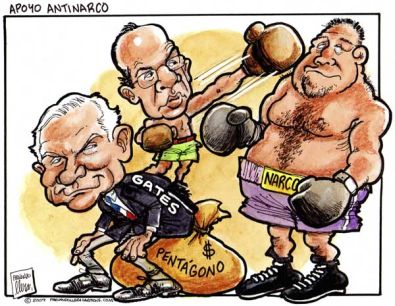
'BACKING THE
ANTI-DRUG BATTLE'
Cartoon shows Mexican President Calderon punching a
narco-trafficker, as Defense Secretary
Robert Gates sits
on the Pentagon's bag of money.
[Excelsior, Mexico]
Excelsior, Mexico
How Mexico Could Legalize Pot - Whether U.S. Likes it or Not
"If
all of Mexico were to adopt the Californian legislation (or some version like
it that didn’t go any further), Washington would have no political argument to
pressure us with, since our natural response would be, 'And why is such
legislation permitted in 13 of the American states?'"
By José A. Crespo

Translated By Douglas Myles Rasmussen
February 27, 2009
Mexico - Excelsior - Original Article (Spanish)
|

|
|
Mexican Attorney
General Eduardo Medina Mora: Despite shocking bloodshed in Mexico's
streets, he insists that the war against Mexico's drug cartels is
succceeding.
BBC NEWS VIDEO: A Massive
crackdown across the United States against the Mexican drug cartels nets 750
people, $59 million in cash, 149 vehicles, three aircraft, three ships,
16,000 pounds of pot, 12,000 kilos of cocaine and over a million Ecstasy
pills, Feb. 25, 00:00:50 
BBC NEWS VIDEO: Eight Mexican soldiers decapitated by drug
gangs, Dec. 23, 2008, 00:01:26 
|
|
|
Those of us who consider that
the least bad option for dealing with drugs would be their (gradual, careful, exploratory)
decriminalization, and treating the problem as a public health issue (as is already the case with alcohol and tobacco), are
aware of the difficulty of implementing such a political strategy. We know that
as long as the United States opposes such a measure, it will be impossible to implement,
since the pressure from the country against such a move would be irresistible
for the weak governments of Latin America.
From his statements, it seems
that [President] Felipe Calderón is one of those who
think this way, contrary to what one might infer from his costly anti-narco-trafficking strategy. At least some of the statements
he made in his second State of the Nation speech suggest this. When asked by journalist
Denise Maerker, "Wouldn’t it be cheaper in
resources and human lives to promote the legalization of drugs?," Calderón replied: "That's of course an alternative
that will have to be explored, (but) it should be a universal effort that I
don't see … I understand the logic, which is to kill off the economic stimulus.
But if, for example, the ban persists on the northern side of the border, you
won’t kill the economic stimulus and will allow the impunity to worsen."
So in this regard, the main
problem Calderón sees in legalization is that it won't
also be applied in the United States, so the illicit trade would continue.
But the United States has
already legalized part of this trade; that is to say, cannabis. Not at the national
level, it's true, but in 13 of the U.S. states. This shows that to decriminalize
marijuana, it isn't absolutely necessary to wait for everyone else to do it (and
not the entire continent). The entities of the American Union that have already
done this didn’t wait to do so by national means: they decided to do so in a
sovereign manner, despite the fact that the politics of prohibition continue in
the rest of that country.
What Mexico could do to alter
its failed drug policy - with a view to sapping the economic power of the
cartels, which translates into political power, corruption and the capacity to
mount armed attacks - is to follow the steps taken in the United States, or to
put it more clearly, some of its states that have decided to decriminalize
marijuana. In the case of California, the fifth largest economy in the world
that also forms the border with Mexico (particularly with Tijuana, one of the "failed
cities" that have succumbed to the fallen government and anarchy that are
products of the War on Drugs).
SEE ALSO ON THIS:
Excelsior, Mexico:
How Mexico Could Legalize Pot - Whether U.S. Likes it or Not
Excelsior, Mexico:
Relations Between U.S. and Mexico are Deteriorating
La Tercera, Chile
Mexico's Drug War: No Way Out But to Fight On
Semana, Colombia:
Michael Phelps and American Hypocricy on the Use of Drugs
Therefore, the pragmatic
approach would be to decriminalize marijuana (tackling the problem with the
fewest possible human and social costs), but starting with a method no different
from that followed by the United States. It would be easier and more feasible politically
to adopt legislation similar to, for example, California’s, where it's legal to
grow, sell and consume marijuana for medical purposes. To do this in Mexico for
recreational purposes is less politically viable (very little, really).
Posted by WORLDMEETS.US
In California you can go to
the doctor and ask for a prescription to buy legal marijuana in stores, if you
suffer - or say you suffer - from headaches, loss of appetite or insomnia (since
marijuana is used to relax the body, trigger hunger and make you drowsy). The
patient must pay about $20 for the prescription, which he can take to a legal
store to purchase a certain amount of marijuana, which is of better quality
than that available on the black market.
Many consumers
prefer to go through these procedures and additional costs in order to obtain a
higher quality product and, therefore, less harmful to one's health. If all of
Mexico were to adopt the Californian legislation (or some version like it that
didn’t go any further), Washington would have no political argument to pressure
us with, since our natural response would be, "And why is such legislation
permitted in 13 of the American states?" It would not go one step further
than in the United States, so as not to lead to consequent political pressure. In
fact, the government of Barack Obama might be more sensitive to such a decision
on the part of Mexico, given that this president used marijuana and cocaine in
his youth, according as he has said.

'LIGHT-HANDED
PREVENTIVE MEASURES'
The Mexican
man's hat says 'Mexican Narco'
[Excelsior, Mexico]
What would Mexico gain by
this? The de-funding of much of the income of the Mexican
cartels. Could the illegal trafficking to U.S. States that have not
decriminalized weed to continue? In principal, yes, but it could just as
well happen - and surely already does - between the states of the American
Union. If such traffic doesn't create the same violence there that it does here,
it will be because the government of that country has decided to follow a
different strategy from ours (to fight demand more than supply). Instead of
shouting ourselves hoarse over a war, the only result which has been to elevate
violence and insecurity - and to escalate the number of victims, it would be far
more worthwhile for it to follow the steps of the United States (themselves) in
terms of decriminalization.
Posted by WORLDMEETS.US
At least, alternatives to the
current strategy should be seriously discussed in specialized seminars
organized by the [Mexican] Congress. That would do more good than the mud that
partisans are throwing over the failure of the Calderón
strategy on this issue. Because if we do nothing effective on this, "the
next president could be a Narco," as Calderón warned distinguished
members of the PRI [the Partido Revolucionario
Institucional, the main opposition party to the PAN
of President Calderón], at a meeting held at Los Pinos.
CLICK HERE FOR SPANISH VERSION
[Posted by WORLDMEETS.US March 2, 10:25pm]